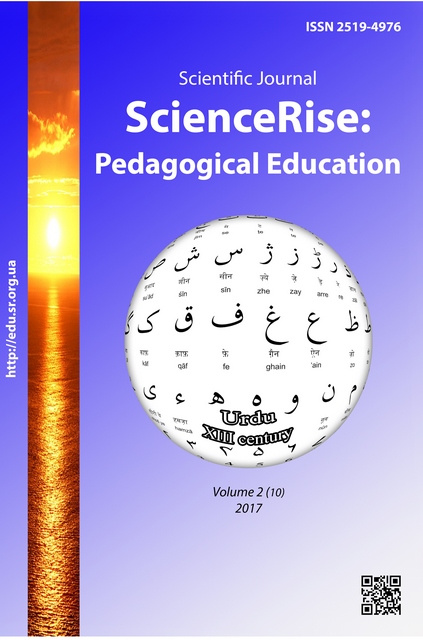The grounding of pedagogical conditions of development of military special competence in officers-border guards during the master training
DOI:
https://doi.org/10.15587/2519-4984.2017.94382Keywords:
military-special competence, officers, selection of content of learning material, andragogical modelAbstract
The pedagogical conditions of the development of military-special competence of officers-border guards were discovered in the article. The topicality of the solution of problem of improvement of professional training of officers of border administration is caused by the series of factors, the one of which is a growth of the military component in professional activity of officers-border guards and also the difficult military-political situation in the East of Ukraine. The article grounds that the effectiveness of development of this competence during the master training will grow at the expanse of provision of the selection of content of the learning material in special disciplines taking into account the results of system analysis of the threats of border safety. The great importance is also inherent to the modeling and solution of practical situations of professional activity according to the problem principles. It is important for the formation and development of the officers’ abilities to making managerial decisions on organization of state border defense under special conditions and at special operations. The formation of communicative and pedagogical skills in officers on the base of andragogical model of interactive study is also the important pedagogical condition of the development of military-special competence of the officers of State border service of Ukraine. It is indicated by the results of analysis of scientific sources and the author’s experience. The solution of problem of the improvement of professional training of the officers of border administration depends on correct organization of their self-education. This process must be aimed at formation and development of the skills of work with different information sources, improvement of analytic and creative skills and increase of the level of masters’ independence
References
- Safin, O. D. (1997). Psykholohiya upravlins'koyi diyal'nosti komandyra. Khmel'nyts'kyy: Vyd-vo Akademiyi PVU, 149.
- Orlov, Ye. V., Zalozh, V. V., Kushnir, V. S. (2011). Naukovi osnovy upravlinnya. Khmel'nyts'kyy: Vyd-vo NADPSU, 150.
- Nazarenko, V. O., Mazur, V. Yu., Ivashkov, Yu. B. et. al. (2015). Operatyvno-sluzhbova diyal'nist' viddilu prykordonnoyi sluzhby Derzhavnoyi prykordonnoyi sluzhby Ukrayiny. Khmel'nyts'kyy: Vyd-vo NADPSU, 428.
- Poltorak, S. T. (2003). Pedahohichni umovy formuvannya umin' komandyra pidrozdilu u maybutnikh ofitseriv MVS Ukrayiny. Khmel'nyts'kyy: Vyd-vo NADPSU, 18.
- Neshchadym, M. I. (2004). Viys'kova osvita Ukrayiny: istoriya, teoriya, metodolohiya, praktyka. Kyiv, 57.
- Maksymenko, S. D., Oleksiyenko, B. M. (2001). Moral'no-psykholohichne zabezpechennya sluzhbovoyi diyal'nosti Prykordonnykh viys'k Ukrayiny. Khmel'nyts'kyy: Vyd-vo NAPVU, 448.
- Yvanov, V. P. (1986). Formyrovanye lychnosty ofytsera. Moscow: Voenyzdat, 160.
- Yezheyev, M., Nikolayenko, S., Ustymenko, O. (2009.) Pidhotovka ofitsers'koho korpusu ta fakhivtsiv u sferi natsional'noyi bezpeky v SShA. Dosvid dlya Ukrayiny. Visnyk Natsional'noyi akademiyi derzhavnoho upravlinnya pry Prezydentovi Ukrayiny, 2, 314–323.
- Ovcharuk, O. V. (Ed.) (2004). Kompetentnisnyy pidkhid u suchasniy osviti: svitovyy dosvid ta ukrayins'ki perspektyvy. Kyiv: K.І.С, 112.
- Bulhakova, N. B., Rakhmanov, V. O. (2012). Metodyka vykladannya u vyshchiy shkoli. Kyiv: NAU, 204.
- Rozanova, V. A. (1999). Psykholohyya upravlenyya. Moscow: ZAO «Byznes-shkola «Yntel-Syntez», 352.
- Carafano, J., Kochemc, A. (2005). Military Education Needs Reform. Defense News, 4, 15–19.
- Orban-Lembryk, L. E. (2003). Psykholohiya upravlinnya. Kyiv: Akademvydav, 567.
- Sysoyeva, S. O., Pometun, O. I. (2011). Interaktyvni tekhnolohiyi navchannya doroslykh. Kyiv: EKMO, 320.
Downloads
Published
How to Cite
Issue
Section
License
Copyright (c) 2017 Vitaliy Veretilnik, Alexander Didenko, Alexander Didenko

This work is licensed under a Creative Commons Attribution 4.0 International License.
Our journal abides by the Creative Commons CC BY copyright rights and permissions for open access journals.
Authors, who are published in this journal, agree to the following conditions:
1. The authors reserve the right to authorship of the work and pass the first publication right of this work to the journal under the terms of a Creative Commons CC BY, which allows others to freely distribute the published research with the obligatory reference to the authors of the original work and the first publication of the work in this journal.
2. The authors have the right to conclude separate supplement agreements that relate to non-exclusive work distribution in the form in which it has been published by the journal (for example, to upload the work to the online storage of the journal or publish it as part of a monograph), provided that the reference to the first publication of the work in this journal is included.







